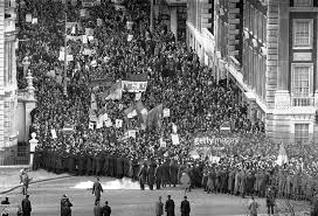But whatever his failings and his record of failure, we in Britain can be grateful to him for one thing.
He kept us out of Vietnam.
Where Thatcher leapt at the opportunity to take on Argentina over the Falklands, and Blair jumped into bed with Bush to invade Iraq, Harold Wilson devoted his energies duing the Vietnam War to peace initiatives, no less than nine of them during the course of Johnson’s presidency. And if his refusal to send British troops was more practical and ‘pragmatic’ (a Wilson word) than principled, and his refusal to condemn the American position upset the Labour Left, he did ensure that our generation was not called upon to fight an immoral war in south-east Asia.
I was contemplating this as I watched the opening half-dozen episodes of the Ken Burns documentary, The Vietnam War. It is notable for its inclusion of Vietnamese voices as well as American, reminding us that this conflict was not solely or even primarily an American tragedy, despite the fact that the blockbuster movies (Apocalypse Now, The Deer Hunter, Born on the 4th of July, Platoon) and the key texts (Michael Herr’s Dispatches, Norman Mailer’s Why Are We in Vietnam?, James Crumley’s And One To Count Cadence) focus on the American experience and in so doing reflect the Kennedy and Johnson administrations’ treatment of Vietnam as an abstract concept in a game of dominoes rather than a country and a people with a long history and a vibrant culture.
By the end, of course, Vietnam was not longer even a concept; it was a situation from which the US needed to extract itself for reasons which had more to do with US politics than any recognition of the wrongness of the initial policy and the war itself.
What the Vietnamese call ‘the American War’ was the backdrop to my teenage and student years: I was 15 in 1964 when the first major demonstration against the war, at Berkeley, occurred and 18 at the time of the Tet Offensive in 1967. It is a truism that the war initiated a new era of divisive politics and a breakdown in the national consensus; it is also true that the war, the resistance to the war, and the raising of black consciousness which was an essential part of both, affected many of us beyond the shores of the US profoundly and individually.
Certainly it was our political focus in those years, and our political philosophy was forged from it and around it. My politics in particular are defined by it to this day and watching the documentary is a form of catharsis for my generation.
If you are not doing so, you should.
Today from the everysmith vaults: Zappa from the Boston Music Hall, 1976. Frank’s on fire.






 RSS Feed
RSS Feed